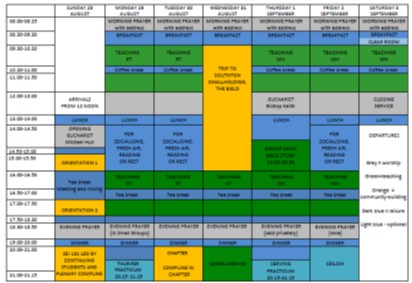The schedule for Orientation Week is a colourful tapestry . . . and deliberately so. Its design mirrors the nature of the formational programme which those training for lay and ordained ministry at SEI follow; one in which prayer, study (‘work’) and community living are woven into a single rope, each part being equally important. Formation is essentially a process of integration – of the intellectual, spiritual, ministerial and professional life of the trainee.
Grey represents times of shared prayer and worship. These comprise the saying of Morning and Evening Prayer, the former being accompanied by brief ‘Thoughts for the day’; prayer in one of the Small Groups to which each student is assigned; Eucharists with sermons; a Praise Service led by members of the Worship Team from St Paul’s and St George’s Edinburgh. A varied and sustaining diet.
Green represents times of study. Dr Richard Tiplady will teach a module on ‘Mission Entrepreneurship’ and Dr Michael Hull one on ‘Christian Worship’. The Rt Revd Keith Riglin, Bishop of Argyll and The Isles, bishop-in-residence for the week, will lead a Bible Study, while Mrs Deborah Mundy, Provincial President of the Mothers’ Union in Scotland, will speak about the organisation’s work in the field of gender-based violence and domestic abuse.
Mustard in the programme represents times of ‘growing together in unity and love’ as a community. At the outset, Anne Tomlinson will first preach about, and then lead sessions on, the values and ethos of the community, this to be followed by ‘SEI 101’ and Chapter, two further introductions to life in the community led by the Continuing Students. Midway through the week everyone will visit Southton Smallholding at the Bield, Blackruthven, a social enterprise providing outdoor therapeutic work for adults with learning disabilities, an activity which dovetails with Richard’s teaching and the green ethic of the community.
The blues, dark and light, represent very necessary times of leisure, reminding us of Abba Anthony’s wisdom that ‘if we draw the string too tight, the brethren (sic) will snap under the strain’. These times remind us that boundaries and self-care are essential aspects of ministerial life, helping to prevent burnout. So room is made in the schedule for times for socialising, for being apart, for singing and dancing, for enjoying the grounds; for stillness and silence.
Throughout the week, one further emphasis will be woven through the programme, that of creation care. We will celebrate a Day of Prayer for our sister theological institute, Centro de Estudos Anglicanos, Brazil; mark the World Day of Prayer for the Care of Creation and Thursdays in Black; begin using the Season of Creation liturgies; and make choices about how we travel, what we use and what we eat. Attending to this green ethic is an integral and essential part of the formation programme. As Rowan Williams said at the launch of the campaign, How many lightbulbs does it take to change a Christian?, ‘For the Church of the 21st century, good ecology is not an optional extra but a matter of justice. It is therefore central to what it means to be a Christian.’


